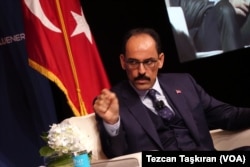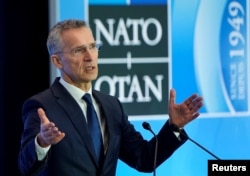As tensions escalate between Turkey and the United States over the procurement of Russian missiles, Ankara is looking to NATO, which it sees as taking a more nuanced stance on the controversial weapons purchase.
U.S. Vice President Mike Pence's warning this month that Turkey's future in NATO could be at risk if Ankara takes delivery of Russian S-400 missiles drew an angry response from Turkish presidential spokesman Ibrahim Kalin.
"We are one of the members. We are a country that has a say in all decisions," Kalin said. "Therefore, we will not allow the questioning of Turkey's position in NATO."
Washington claims the S-400 missiles, which are due to be delivered in July, pose a security threat to NATO military systems in Turkey — in particular, America's latest fighter jet, the F-35. Russia is developing the S-400 system to counter the F-35's stealth technology.
U.S. warning
While America is warning of far-reaching military and financial sanctions if the Russian missile system is delivered to Turkey, analysts say NATO appears to be taking a different stance.
"We have to make a difference here between Turkish-NATO relations and Turkey-American relations," said international relations professor Huseyin Bagci of Ankara's Middle East Technical University. "Bilaterally [between Turkey and the U.S.] speaking, it's not a good [situation], but concerning NATO, there isn't a problem."
"There is not one sentence from the NATO secretary-general that Turkey cannot buy this [S-400] system," he added. "NATO Secretary-General Jens Stoltenberg tells Turkey every ally has the right to buy any system; however, the political consequences, the strategic consequences, of such a purchase, he does not say anything. So the Turks are confused [about] whom to believe, the Americans or NATO."
This month, Stoltenberg again refused to be drawn into the controversy over Turkey's S-400 purchase, reiterating his stance that it was a "national decision of each NATO ally to determine on its own."
Stoltenberg appears to be seeking to position NATO as an honest broker in resolving the dispute.
"We see that this is an issue which has created disagreement between allies, and NATO provides a platform for allies to address issues like this," he said.
With Turkey devoting military resources to many NATO theaters of operation, from Afghanistan to Kosovo, analysts suggest the military alliance will be wary of being drawn into the increasingly bitter dispute between Ankara and Washington.
Regional role
Turkey's geographical importance bordering many of the world's most unstable regions and its preparedness to play an active role were acknowledged this month at a NATO gathering at the Turkish Mediterranean resort of Antalya.
Turkey "sees itself as a bridge between Europe and the Middle East," said Madeleine Moon, head of the NATO Parliament Assembly, "which gives it a leading role in promoting security and stability" in the Middle East and North Africa.
While Ankara is deepening its ties with Moscow, it's also stepping up its support of NATO efforts to counter Russian influence.
"Turkey relations with Moscow are very close, so there is an antagonism there [with its Western allies]," said Aydin Selcen, a former senior Turkish diplomat. "But also at the same time, although the rhetoric is very harsh against some allies, Turkey's participation in NATO exercises in the Baltic Sea and Black Sea is at unprecedented levels and quality."
Selcen offers two explanations for the apparent contradictory foreign policy of Ankara toward NATO and Western allies.
"Either there is some sort of disconnect or lack of coordination between the Turkish presidency and national defense ministry," Selcen said, "which is, in today's Turkish national regime, quite improbable, or Ankara is trying to extract some flexibility from Washington, which is not forthcoming."
Turkey's more robust approach toward its NATO partners could be threatening a new quarrel within the alliance. According to reports, Ankara is set to veto Macedonia's NATO membership unless Skopje extradites Turkish nationals wanted in connection with the failed 2016 Turkey coup.
Turkey's future in alliance
Turkey's stance toward some NATO members and its deepening ties with Moscow are leading some to question the country's future within the alliance, a fear Turkish presidential adviser Gulnor Aybet appears happy to stoke.
"If the United States continues to approach Turkey with a zero-sum game … then the doors, which are currently open for the future of relations, could turn toward another partner, and that is Russia," Aybet said this month during a panel discussion in Washington.
However, international relations professor Bagci said it's essential to look beyond the political rhetoric and understand that the decades-long strategic importance of NATO to Turkey remains unchanged.
"Russia is not an alternative [to Turkey]. Turkey will not look to Russia as a most trusted ally. It is not the case and will not be," Bagci said. "Turkey always uses Russia as a balance of power, as leverage. Turkey will not leave NATO unless NATO leaves Turkey. Then, Russia is an alternative."







